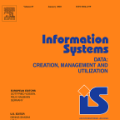Discovery of new knowledge is increasingly data-driven, predicated on a team's ability to collaboratively create, find, analyze, retrieve, and share pertinent datasets over the duration of an investigation. This is especially true in the domain of scientific discovery where generation, analysis, and interpretation of data are the fundamental mechanisms by which research teams collaborate to achieve their shared scientific goal. Data-driven discovery in general, and scientific discovery in particular, is distinguished by complex and diverse data models and formats that evolve over the lifetime of an investigation. While databases and related information systems have the potential to be valuable tools in the discovery process, developing effective interfaces for data-driven discovery remains a roadblock to the application of database technology as an essential tool in scientific investigations. In this paper, we present a model-adaptive approach to creating interaction environments for data-driven discovery of scientific data that automatically generates interactive user interfaces for editing, searching, and viewing scientific data based entirely on introspection of an extended relational data model. We have applied model-adaptive interface generation to many active scientific investigations spanning domains of proteomics, bioinformatics, neuroscience, occupational therapy, stem cells, genitourinary, craniofacial development, and others. We present the approach, its implementation, and its evaluation through analysis of its usage in diverse scientific settings.
翻译:新知识的发现日益以数据为动力,取决于团队在调查期间协作创建、发现、分析、检索和分享相关数据集的能力。在科学发现领域尤其如此,在科学发现领域,数据生成、分析和解释是研究团队合作实现其共同科学目标的基本机制。数据驱动发现,特别是科学发现,被在调查期间演变的复杂而多样的数据模型和格式所区别。数据库和相关信息系统有可能成为发现过程中的宝贵工具,但开发数据驱动发现的有效界面仍然是将数据库技术用作科学研究基本工具的障碍。在本文件中,我们提出了一个模型适应性办法,为数据驱动的科学数据发现创造互动环境,自动生成编辑、搜索和查看互动式用户界面,完全基于对扩展关系数据模型的内镜。我们将模型适应性接口生成应用于许多活跃的科学调查领域,包括先质、生物本研究、神经学、神经学、当前研发方法和其他方法。





